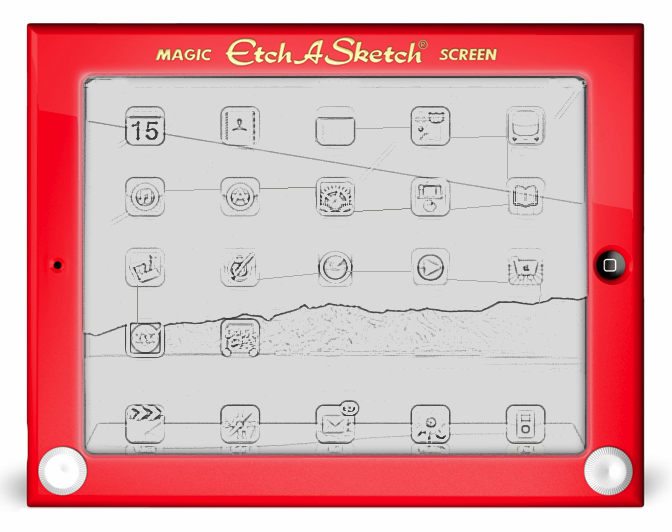Page 218 of 410
Re: GAME: Word of the Day (WOTD)
Posted: Wed Jun 04, 2014 12:55 pm
by Algot Runeman
frenetic
Pronunciation: /frəˈnetik
adjective
Fast and energetic in a rather wild and uncontrolled way: a frenetic pace of activity
Origin
late Middle English (in the sense 'insane'): from Old French frenetique, via Latin from Greek phrenitikos, from phrenitis 'delirium', from phrēn 'mind'. Compare with frantic.
--------------------
The trip home from Boothbay Harbor was calm, at least in our car. Some drivers on the turnpike seem to be unable to simply set the cruise and roll along. There are always some frenetic souls who change lanes suddenly, even crossing three other travel lanes to gain a two car advantage.
Re: GAME: Word of the Day (WOTD)
Posted: Thu Jun 05, 2014 7:09 am
by Algot Runeman
rasa
Pronunciation: /ˈrəsə
noun
Hinduism
Essence, flavor, or sentiment, in particular the characteristic quality of music, literature, and drama.
Origin
Sanskrit, literally 'juice'.
--------------------
Ellie examined the painting on the wall, appreciating the essence, the rasa, of the scene composed of tiny brush strokes. Art training in Paris helped her understand the technique, but she had loved the painting even as a little girl in her father's Calcutta house.
Re: GAME: Word of the Day (WOTD)
Posted: Thu Jun 05, 2014 10:46 am
by E Pericoloso Sporgersi
Algot Runeman wrote:rasa
I've always been fascinated by a magic screen.
Especially the way I could do
tabula rasa and start over again as if nothing had ever been there.
19 months ago the nostalgia became irresistable and I bought an iPad.
Re: GAME: Word of the Day (WOTD)
Posted: Fri Jun 06, 2014 7:23 am
by Algot Runeman
welkin
Pronunciation: /ˈwelkin
noun
• literary The sky or heaven.
Origin
Old English wolcen 'cloud, sky'; related to Dutch wolk and German Wolke.

------------------
Jess wore his
jerkin so his arms would be free while he was workin'. He glanced up at the welkin to gauge the weather. He'd need sunscreen right up to the leather.
Re: GAME: Word of the Day (WOTD)
Posted: Sun Jun 08, 2014 8:06 am
by Algot Runeman
cognizable
Pronunciation: /ˈkägnəzəbəl, kägˈnīz-
adjective
1 • formal Perceptible; clearly identifiable.
2 Law Within the jurisdiction of a court.
Origin
late 17th century: from cognizance + -able.
 Sarah Gerke
Sarah Gerke
-------------------------
The tattoo on his wrist was a
cognizable reminder that he was a member of the Rebels.
Re: GAME: Word of the Day (WOTD)
Posted: Mon Jun 09, 2014 7:51 am
by Algot Runeman
grouse [definition 2]
Pronunciation: /grous/
verb
[no object]
Complain pettily; grumble: she heard him grousing about his assistant
noun
A grumble or complaint: our biggest grouse was about the noise of the construction work
Origin
early 19th century: of unknown origin; compare with grouch.
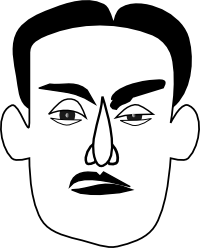
--------------------
In the end, Mark performed his assignment very well. All his
grousing was part of the show. Never look like a volunteer, or your co-workers will steer even more work your way.
Re: GAME: Word of the Day (WOTD)
Posted: Mon Jun 09, 2014 10:39 am
by E Pericoloso Sporgersi
Algot Runeman wrote:grouse
I've long been familiar with the
grouse.
Splotches of it. The famous one, and its black sibling, of course.
Re: GAME: Word of the Day (WOTD)
Posted: Tue Jun 10, 2014 9:54 am
by Algot Runeman
redound
Pronunciation: /riˈdound
verb
[no object]
1 (redound to) • formal Contribute greatly to (a person’s credit or honor): his latest diplomatic effort will redound to his credit
2 (redound upon) • archaic Come back upon; rebound on: may his sin redound upon his head!
[probably by association with rebound1]
Origin
late Middle English (in the sense 'surge up, overflow'): from Old French redonder, from Latin redundare 'surge', from re(d)- 'again' + unda 'a wave'.
 GusEinstein
GusEinstein
--------------------
Carl could dribble madly, shoot accurately from half court, dunk from any angle, but his reputation
redounded to his ability to rebound.
Re: GAME: Word of the Day (WOTD)
Posted: Thu Jun 12, 2014 7:09 am
by Algot Runeman
oligopoly
Pronunciation: /ˌäliˈgäpəlē
noun (plural oligopolies)
A state of limited competition, in which a market is shared by a small number of producers or sellers.
Origin
late 19th century: from oligo- 'small number', on the pattern of monopoly.
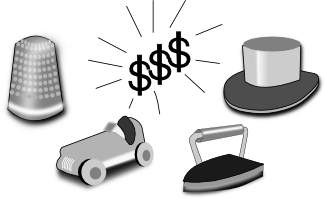
-=-=-=-=-=-=-=-=-=-=-=-=-=-=-
On a trip to Gallipoli, Marco gathered the heads of the local
oligopoly to play a game of Monopoly™. The game proceeded sloppily. There was not a clear winner 'till long after dinner.
Re: GAME: Word of the Day (WOTD)
Posted: Fri Jun 13, 2014 7:25 am
by Algot Runeman
jiggery-pokery
Pronunciation: /ˌjigərē ˈpōkərē/
noun
informal , chiefly British
Deceitful or dishonest behavior.
Origin
late 19th century: probably a variant of Scots joukery-pawkery, from jouk 'dodge, skulk', of unknown origin.
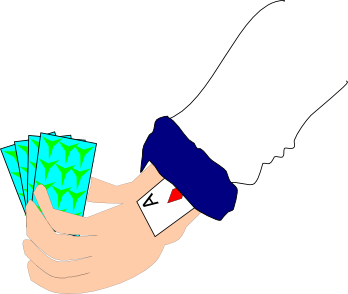
-=-=-=-=-=-=-=-=-=-=-
The jig is up. Your days playing poker with us are over because of your routine
jiggery-pokery. Besides, you drink all our beer and never bring any to the games.
Re: GAME: Word of the Day (WOTD)
Posted: Fri Jun 13, 2014 11:42 am
by E Pericoloso Sporgersi
Algot Runeman wrote:oligopoly & jiggery-pokery
Would shady people try to commit
jiggery-pokery in a small rural
oligopoly?
Re: GAME: Word of the Day (WOTD)
Posted: Sat Jun 14, 2014 5:16 am
by Algot Runeman
rehoboam
Pronunciation: /ˌrē(h)əˈbōəm/
noun
A wine bottle of about six times the standard size.
Origin
late 19th century: from the name Rehoboam.
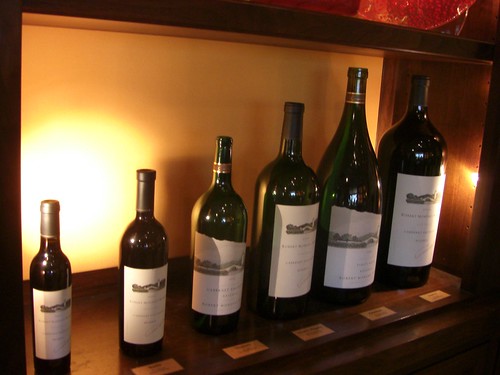 michaelgalero
michaelgalero
-==-==-==-==-==-==-==-==-==-==-==-==-
Now don't whine, not all big bottles of this stuff are Ripple. We sell
rehoboams of the best vintages here.
Re: GAME: Word of the Day (WOTD)
Posted: Sun Jun 15, 2014 6:06 am
by Algot Runeman
differentia
Pronunciation: /ˌdifəˈrenSH(ē)ə/
noun (plural differentiae /-SHēˌē/)
1 A distinguishing mark or characteristic.
1.1 chiefly Philosophy An attribute that distinguishes a species of thing from other species of the same genus.
Origin
late 17th century: from Latin, literally 'difference', from different- 'carrying away' (see different).
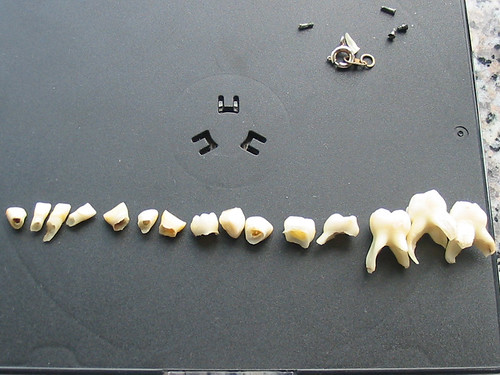 Simon Pearson
Simon Pearson
--==--==--==--==--==--==--==--==--==--==--==--
Important
differentia of incisors, canines, bicuspids and molars include the number of points (cusps) on them. Besides that, they look different and are in different locations in the jaw and stuff like that. Oh, yeah, you know, the same kind of tooth also differs from one animal to another.
Re: GAME: Word of the Day (WOTD)
Posted: Mon Jun 16, 2014 4:17 am
by Algot Runeman
glib
Pronunciation: /glib/
adjective (glibber, glibbest)
(Of words or the person speaking them) fluent and voluble but insincere and shallow: she was careful not to let the answer sound too glib
Origin
late 16th century (also in the sense 'smooth, unimpeded'): ultimately of Germanic origin; related to Dutch glibberig 'slippery' and German glibberig 'slimy'.
----====----====----====----====----
Since my comments are glib
And I'm inclined to fib,
It should be no surprise
Another wins the prize.
Re: GAME: Word of the Day (WOTD)
Posted: Mon Jun 16, 2014 6:36 am
by E Pericoloso Sporgersi
Algot Runeman wrote:differentia
 glib
glib
The teeth, shown in the above image that Algot posted, have a distinctive
differentia:
- They're all human deciduous teeth, called milk teeth by (grand)parents, children and tooth fairies.
- They came loose and fell out spontaneously except for the three larger ones on the right, those were forcibly extracted (but I have no clue why they were pulled).
- Shown are only deciduous incisors, canines and molars because humans have no deciduous bicuspids (also called premolars).
- It's not a full set. Normally children get and lose 20 milk teeth.
- Very often deciduous teeth are a noticeably whiter shade than their permanent replacements.
This pretty child (+/- 7 y) has 2 permanent lower central incisors (the jagged edge will soon wear off)
The other visible teeth are deciduous. Permanent incisors will erupt in the gaps.

Please note that this post is not meant to be
glib. That was never my intention.
P.S.
Algot posted his '
glib' post at 05:17 am his local time. He must have gone fishing again, I guess.
Re: GAME: Word of the Day (WOTD)
Posted: Mon Jun 16, 2014 7:51 am
by Algot Runeman
E.P.S. wrote:He must have gone fishing again, I guess.
Well, actually there were no fish. It was "gone swimming" in a YMCA pool by 6:00
A.M. I keep thinking a retired guy should go fishing, but I never developed the habit as a younger man.
It is interesting to think of "deciduous" as describing both the milk teeth and trees. Having studied botany instead of dentistry, I imagine tiny leafy trees in a kid's mouth when you talk about the deciduous teeth.
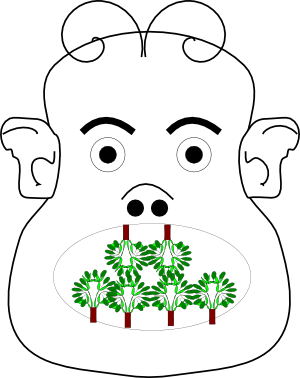
Thanks for the educational information.
May I also ask if there is a known reason for the incisors having the little points on them initially?
Re: GAME: Word of the Day (WOTD)
Posted: Mon Jun 16, 2014 9:35 am
by E Pericoloso Sporgersi
Algot Runeman wrote:May I also ask if there is a known reason for the incisors having the little points on them initially?
All freshly erupted teeth are more or less jagged on their cusps or incisal edges. It's most noticeable with incisor teeth. That's because initially the enamel of the edges is laid down by separate lobes which fuse together a bit later on. Central upper and lower incisors start with 3 lobes each; lateral upper and lower incisors start with 2 lobes each.
In the image above the upper incisors show a faint remnant of the jaggedness between the lobes.
Those are the teeth of a young person (about 18 y) as shown by the very rounded angles of the incisal edges.
Compare with the teeth of a much older person (impossible to say how old) in the image below.
Conclusion:
The shape of the visible teeth have a very large influence on a person's apparent age. That's why wrongly shaped artificial teeth or mismatched removable dentures can look ridiculous if they don't fit a person's age.
Re: GAME: Word of the Day (WOTD)
Posted: Mon Jun 16, 2014 12:24 pm
by Algot Runeman
There is always much more than a simple word available from the WotD community.
Thanks, E.P.S.
Re: GAME: Word of the Day (WOTD)
Posted: Tue Jun 17, 2014 7:37 am
by Algot Runeman
humdrum
Pronunciation: /ˈhəmˌdrəm/
adjective
Lacking excitement or variety; dull; monotonous: humdrum routine work
noun
Dullness; monotony: an escape from the humdrum of his life
Origin
mid 16th century: probably a reduplication of hum1.
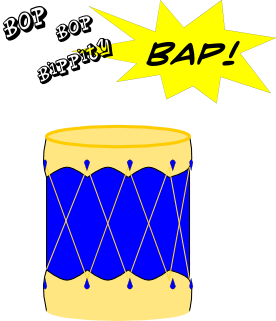
.,.,.,.,.,.,.,.,.,.,.,.,.,.,.,.,.,.,.,.,.
His life was so
humdrum that he frequently sat in a beach chair recliner, hummed a droning tune and kept the beat by drumming his hands on his belly. He wasn't married and had no known prospects.
Re: GAME: Word of the Day (WOTD)
Posted: Wed Jun 18, 2014 7:59 am
by Algot Runeman
acquiescent
Pronunciation: /ˌakwēˈesənt/
adjective
Ready to accept something without protest, or to do what someone else wants: the unions were acquiescent and there was no overt conflict
Origin
early 17th century: from Latin acquiescent- 'remaining at rest', from the verb acquiescere (see acquiesce).
--.--.--.--.--.--.--.--.--.--.--.--
To stay in this frame
Keep playing the game?
No worries mate.
It's really been great!
A month or a year
Sell off your gear.
Go out as you came
Nothing to claim.
Clearly senescent.
Also acquiescent.
End coming near.
No need to fear.
Oh, hell no!
Not ready to go.
If it happens at all.
You bet I will squall.
Re: GAME: Word of the Day (WOTD)
Posted: Thu Jun 19, 2014 7:12 am
by Algot Runeman
frowzy
Pronunciation: /ˈfrouzē/
(also frowsy)
adjective (frowzier, frowziest)
1 Scruffy and neglected in appearance.
1.1 Dingy and stuffy: a frowzy nightclub
Origin
late 17th century (originally dialect): of unknown origin.

^^^^^^^^^^^^^^^^^^^^^^^^^^^^^^^^^^^
Lookin' lousy,
Feelin'
frowzy,
All my days
I spend so drowsy.
A nap can aid,
But then I've stayed
Asleep through dinner.
My goals betrayed.
So take a shower
And shave for power.
Go out to party
Don't waste an hour.
Re: GAME: Word of the Day (WOTD)
Posted: Thu Jun 19, 2014 9:00 am
by E Pericoloso Sporgersi
Algot Runeman wrote:frowzy
In happier days the northern suburb had
The Fronz.
The boys thought him cool and tried to emulate his stance and attitude.
The girls considered him cute and called him
Fronzie.
With his uneven hair, 3-day stubble and inside-out fur coat,
The Fronz looked
frowzy.
But because he was always well bathed and groomed with cologne and spermaceti wax,
Fronzie had no trouble rubbing noses with the Inuit girls.
Re: GAME: Word of the Day (WOTD)
Posted: Fri Jun 20, 2014 7:12 am
by Algot Runeman
nincompoop
Pronunciation: /ˈniNGkəmˌpo͞op/
noun
A foolish or stupid person.
Origin
late 17th century: perhaps from the given name Nicholas or from Nicodemus (by association with the Pharisee of this name, and his naive questioning of Jesus Christ; compare with French nicodème 'simpleton').
-=-=-=-=-=-=-=-=-=-=-=-=-
George wandered through town aimlessly. He knew he was being a nincompoop, but since Sherry left, he could not focus on either work or play. Walking didn't so much ease the pain of loneliness as beat it down.
Re: GAME: Word of the Day (WOTD)
Posted: Sat Jun 21, 2014 8:25 am
by Algot Runeman
catena
Pronunciation: /kəˈtēnə/
noun (plural catenae /-nē, -ˌnī/ or catenas)
technical
1 A connected series or chain.
1.1 A connected series of texts written by early Christian theologians.
Origin
mid 17th century: from Latin, 'chain', originally in catena patrum 'chain of the (Church) Fathers'.

-=-=-=-=-=-=-=-=-=-=-=-=-=-=-=-=-=-=-=-=-=-=-=-
It is a
catena of love and shared experiences which join me to my beloved wife.
Re: GAME: Word of the Day (WOTD)
Posted: Sat Jun 21, 2014 10:15 am
by E Pericoloso Sporgersi
Algot Runeman wrote:nincompoop
catena
Unlike English and Romance languages, the Germanic languages Flemish, Dutch and German have literally countless
catenas of simpler words.
The latter languages allow one to
concatenate words to construct a complex description in a single large
compound word.
For example the Flemish/Dutch word:
Hottentottensoldatenkampeertentententoonstelling,
which means "
Hottentot soldiers' camping tents exhibition".
Though that silly word is grammatically correct, the probability of such an exhibition happening in Belgium is vanishingly small and only a
nincompoop would use such a word in regular conversation or text.
The
concatenation can also cause a long sequence of consonants, up to 8 as in Flemish/Dutch:
Angstschreeuw, angst (fear) + schreeuw (scream), scream of fear
More realistically you have for example:
Flemish/Dutch:
verzamelplaats
German:
Sammelplatz
English:
meeting point
French:
endroit de réunion
Spanish:
lugar de reunion
